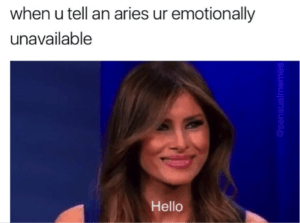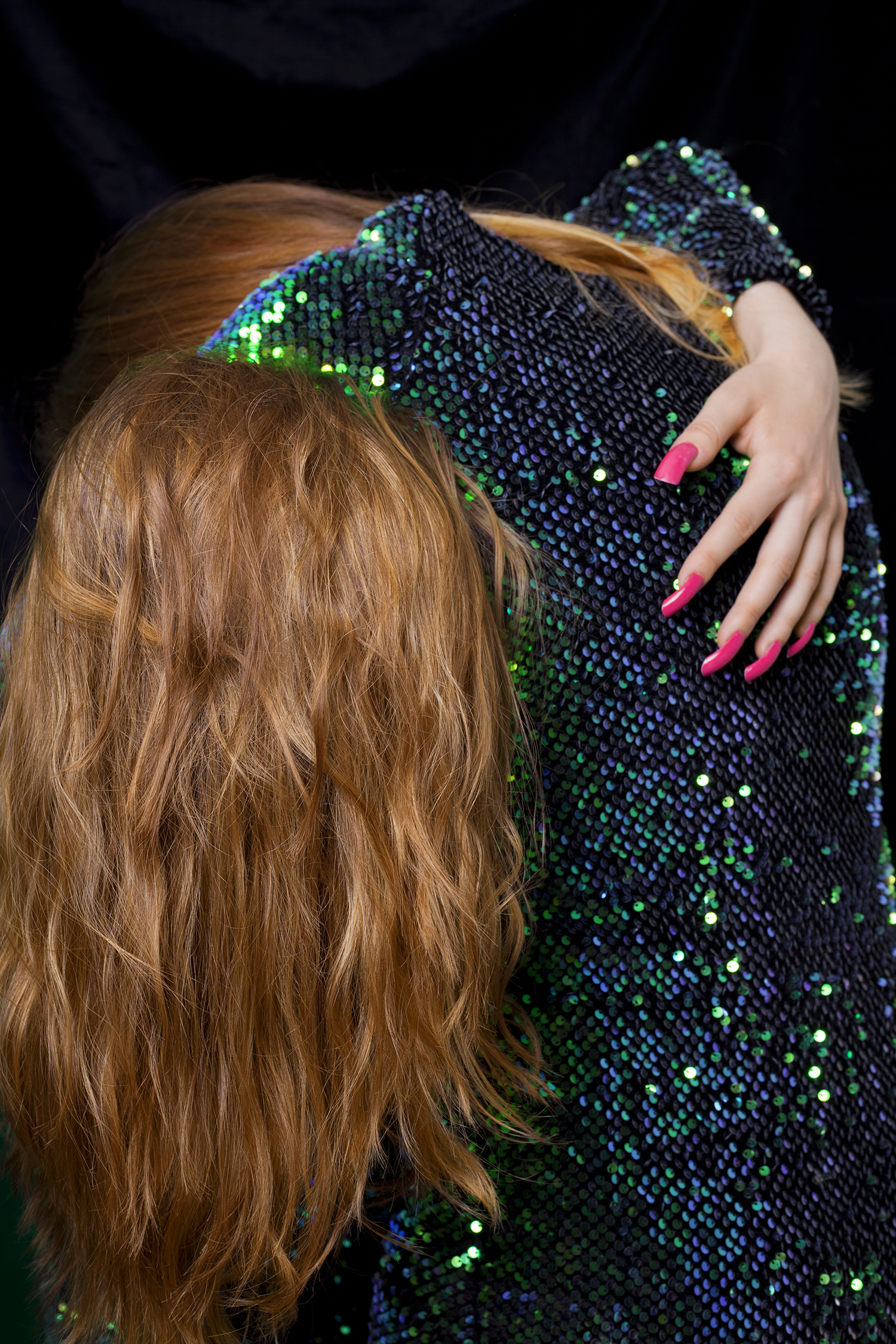Melania Trump’s transformation into a meme happened on July 19, the first night of the Republican National Convention. In front of millions of viewers, she gave a speech that plagiarized excerpts from Michelle Obama’s address to the 2008 Democratic National Convention. Immediately afterward comedians, writers, and social media users gleefully harpooned her: On Twitter, an ironic hashtag, #famousmelaniatrumpquotes, began to trend, with users posting famous quotes (“This is one small step for a man, one giant leap for mankind”) alongside photos of Melania giving her RNC speech. Soon, Melania became associated with Joanne the Scammer, a drag persona created by comedian Branden Miller who rants and raves about insurance fraud, robbing men, and coming up with elaborate, illicit schemes to get rich in short videos, tweets, and Instagram posts. Melania and Joanne seemed like a perfect match.
While simplistic mockery of Melania would be unproductive at best, bigoted at worst, the Melania memes’ specific focus on her failed attempts to act as a First Lady lend her narrative nuance, even a little camp sweetness. In “Notes on ‘Camp,’” Susan Sontag claimed that for something to be deemed camp, it should be extravagant and, more important, innocent of irony — “a seriousness that fails.” Sontag argued, “Camp sees everything in quotation marks. It’s not a lamp, but a ‘lamp,’ not a woman, but a ‘woman.’” According to Sontag, true camp must be accidental and unintentional; intentional camp performances, featuring singers or actors being outlandish on purpose, lack the same guileless power as “pure camp.” Wearing an expensive dress and speaking stolen words, Melania’s speech was “pure camp” — an extravagant, genuine attempt to be taken seriously gone horribly wrong. Stealing from Michelle Obama, Melania gave a “speech” rather than an actual speech, exposing the underlying performativity of political speeches, conventions and campaigns in general.
On CNN, Melania appears as an idea of herself: a bizarre, inscrutable figure. Her blown up presence defies attempts at normalizing the Trumps
In viewing Melania as camp, a hateful figure is reimagined as farcical. By reconfiguring and repurposing Melania as an absurdist character whose presence momentarily undermines the legitimacy of her much more sinister husband, viewers can act as curators of the Trump spectacle, restoring some sense of agency and hope when it is in short supply. The camping of Melania isn’t a radical or necessarily effective political strategy. Rather, it’s a meaningful and distinctly queer method of poking fun that offers fleeting moments of catharsis.
A few days after the election, my timeline was full of grainy pictures of spray-painted swastikas, protest selfies, and academics tweeting mini-lectures, a seemingly endless stream of shock and confusion. Suddenly, sandwiched between the ACLU’s call to arms and a writer’s scathing review of Thomas Friedman’s centrism, there was a moment of relief: a short clip of Melania Trump and her family being interviewed on CNN. In the video, Anderson Cooper starts to ask a question — “over the course of this campaign…” — only to be interrupted by Melania defiantly saying, “Hello!” The camera quickly cuts to Melania, nodding with a grimacing smile as she looks back at a shocked Anderson Cooper.
In the actual 40-minute CNN “town hall” special, Anderson Cooper asks the Trumps innocuous questions about Ivanka’s children and even likens them to the Brady Bunch. The Trumps are treated like an evolved version of the American nuclear family rather than a plutocratic dynasty riding the coattails of white nationalism. In the edited video, Melania appears as the idea of herself: a bizarre, inscrutable figure seemingly unfit for her public role. Her blown up, kitschy presence defies attempts at normalizing the Trumps, pushing them into a prism in which they are performing “First Family” and failing, laughably.
The “Hello” video, like the memes after her convention speech, imposes a camp narrative onto Melania and her family: her abrupt interjection renders the interview an “interview” rather than a serious media affair.
Memes and videos like “Hello” utilize Melania’s camp potential to hack Trump’s aesthetics. Donald Trump’s extravagant brand has earned him an army of admirers and followers — and political success. Whether through live broadcasts of his rallies, images of thousands of white people wearing “Make America Great Again” hats, or the spread of his rhetoric on Twitter, Trump succeeded by aestheticizing his campaign. Melania Trump, on the other hand, continues to signify “a seriousness that fails.” This is partly the effect of misogyny and xenophobia: Melania seems outside the bounds of feminine respectability, and her thick Eastern European accent marks her as “foreign.” But Melania, unlike her husband, has no message and stands for nothing but artifice. She’s a fancily dressed enigma, neither demagogic like her husband nor explicitly sycophantic like his children.
Melania has no message and stands for nothing but artifice. She’s neither demagogic like her husband nor explicitly sycophantic like his children
A former Slovenian model turned personification of nouveau-riche aesthetics, Melania is ripe for camp readings and interpretations, practically Manna from heaven for drag queens. More Julie Cooper from The O.C. than Jackie O, Melania inhibits an exaggerated femininity that seems completely out of place at the White House.
In his Esquire piece exhorting readers not to turn Melania Trump into a gay icon, Brian Moylan argues that unlike Jackie O or Michelle Obama, Melania has “nothing to offer us.” Moylan does acknowledge that Melania is the “very definition of Camp” because she “understands irony as little as she understands understatement,” but argues against idolizing her because of her complicity in her husband’s agenda, describing her as a “model who somehow ended up living in Jackie’s house.” What Moylan overlooks is that it’s precisely her suitability to Trump’s White House that makes her worth appropriating. This appropriation isn’t celebratory; camping doesn’t necessarily mean idolization. Instead, camping can be an ideal way for people to engage with an absurd administration on their own terms.
In Guilty Pleasures: Feminist Camp From Mae West to Madonna, Pamela Robertson, drawing on Sontag, addresses the audience’s role in creating the camp object: “A spectator creates a camp effect in reading texts as camp whether those texts intentionally produced camp or not … camp blurs the line between the seemingly distinct categories of production and reception.”
During the past two decades, conservative women have been continuously camped, with queens all across the country giving unapologetic performances in Sarah Palin- and Michele Bachmann-style drag. Wanda Wisdom, a Minnesota drag queen, ironically tried to marry Bachmann in 2006, joking in a podcast: “Who else would I marry? I love Michele. She’s not afraid to tell people what’s really wrong with this country. If we don’t defend marriage, the terrorists win.” A fundamentalist Christian woman being proposed to by a drag queen inserts a tragically tender sweetness into an oppressive power dynamic. Camp is deployed to highlight and juxtapose the moral seriousness of the oppressor and the survivalist irony of the oppressed. Through embracing these women’s hyperbolized artifice, camp culture aims to neutralize and abstract their politics.
One of the first queer subversions of conservative women happened with Anita Bryant, a singer who rose to fame as Miss Oklahoma in 1959. In 1977, she became a spokesperson for the “Save Our Children” campaign, a coalition movement to overturn anti-discrimination laws in Florida that favored the LGBT community. Using inflammatory rhetoric, Bryant positioned LGBT rights as a fundamental threat to American youth, once proclaiming, “as a mother, I know that homosexuals cannot biologically reproduce children; therefore, they must recruit our children.” As a former beauty queen turned Christian celebrity, Bryant’s aesthetics were a hyper-heterosexual Americana, a performative morality that begged for a camp harpooning.
Bryant was a former spokesperson for Florida Citrus Commission, and one of the primary protest tactics against her was boycotting orange products from Florida — queer activists began sporting kitschy pins and T-shirts with the phrase: “Anita Bryant Sucks Oranges.” On October 27, 1977, in the middle of a press conference in Iowa, a gay activist threw a pie in Bryant’s face, embarrassing her in front of a national audience. After wiping the pie off her face, Bryant said, “At least it was a fruit pie,” before praying for the activists’ well-being.
Camping doesn’t necessarily mean idolization. Instead, camping can be an ideal way for people to engage with an absurd administration on their own terms
Years later, Bryant would get divorced and declare bankruptcy as a result of backlash to her anti-queer activism. And with that narrative of crazed ambition, embarrassment and subsequent failure, her story ripened for camping — a hateful political message abstracted and annihilated with a glittery kiss of irony. In recent years, there have been multiple theater adaptations of her life. In the 2016 comedy Anita Bryant’s Playboy Interview — a word-for-word adaptation of her 1978 Playboy magazine interview — Bryant is played by a drag queen. Playwright Robert Whitty stated in an op-ed for the Advocate, “What we ultimately hoped to bring about in presenting a literal staging of Anita’s interview was a chance to not only laugh at the absurdity and pathos of it all but to contemplate how a hateful mind evolves, and what it might take to diminish that hatred.”
Similarly, the Melania meme relishes the opportunity to create an exaggerated, hypothetical narrative. The meme isn’t intended to explore a hateful subjectivity, but rather to inflate Melania to kitschy proportions while simultaneously reducing her to a “seriousness that fails.” Where Trump succeeds in his absurd schemes, Melania fails miserably; camping her on that basis can be both humanizing and critical.
One of the latest reincarnations of Melania the Scammer appeared in the form of an “Evil Kermit the Frog” meme. Featuring a still from 2014’s Muppets Most Wanted, in which Kermit the Frog speaks to his evil twin, these memes play with the relatable tension between what one should do versus what one wants:

The Melania in all of us takes the easy route and shamelessly orders a term paper off the internet. Her face has come to signify a kitschy Machiavellianism — a comedic counterpart to her husband’s less trivial authoritarianism. Unlike the camping of Michele Bachmann or Bryant, there’s an apolitical nature to the Melania meme in which she isn’t oppressive or demagogic, but rather laughably desperate.
“I don’t think that merely mocking her image would be especially disruptive or even subversive,” said the Instagram user behind @malefragility. “Images themselves are less compelling than the themes or questions they invoke. So, if memes about Melania raise questions about patriarchy and white supremacy, that’s great. But if they are just making fun of women, they probably won’t do much.” Camp culture always runs the risk of objectifying, rather than celebrating, the female artifice. Melania the Scammer could easily devolve into merely a mockery of women in general, and it would be hypocritical for an anti-Trump movement to mock someone for being a foreigner.
While the space of a gay club, theater, or rally endowed camp works with a clear sense of intentionality, popular memes are a more ambiguous and decontextualized medium — relying on relatable and relevant jokes, rather than societal critiques. Such a nonsensical and Dadaist art form can result in a chaotic stew of signifiers that lacks a cohesive, subversive call to arms. Moreover, as Melania becomes more associated with campy failure than her husband’s oppressive politics, the risk is that her image will simply become trivial. The camping of Melania through memes could flatten and dilute Donald Trump’s politics without providing the insightful and mobilizing message of an “Anita Bryant Sucks Oranges” pin.
However, memes also democratize the spectacle of politics, making everyday social media users authors of a new narrative in which Melania comes to signify something entirely different than what Donald Trump had intended.

“Though normalizing those affiliated with Trump is harmful, for some reason the reaction image of Melania with the simple ‘hello’ caption evoked a very physical response within me,” said the Instagram user behind @Sensualmemes. “It was so ludicrous that I couldn’t stop laughing. My own caption was an afterthought.” Melania becomes an ambiguous entity, completely separate from her political affiliation. Her inscrutability lends itself perfectly to reuse: that ambitious grin could apply to anything from “scamming,” cheating on homework, to horoscope humor. Camping is mockery that fundamentally questions the basis of a subject’s legitimacy, allowing for much needed catharsis in settings overflowing with righteous seriousness. Melania Trump as a camp figure is part of a broader desire to insert sweetness and play into a space her husband has come to dominate.
On Twitter, a reoccurring joke is for users to irreverently retweet a celebrity’s weird messages from years ago with no particular rhyme or reason. Melania Trump’s Twitter — composed of dead-gazed mirror selfies, aerial shots from private jets, and bathing suit pictures — is an easy target for this joke. Her most famous and popular tweet comes from 2012: a photo of a beluga whale, with the text, What is she thinking? After the election, the tweet resurfaced with users adding comments that ranged from nihilistic (“She’s thinking about death”) to referencing her previous faux pas (“She’s thinking about stealing speeches”) to the overtly political (“She’s thinking about how she’s going to die because your husband doesn’t believe in climate change”).
The tweet’s popularity could derive from the meta-spectacle of Melania questioning the subjectivity of another enigma. Whether she’s on the RNC stage giving a plagiarized speech, interrupting Anderson Cooper, or sitting alongside her husband in their luxury penthouse, as a camp meme and as a trophy wife, the question remains for all of us: What is she thinking? The tweet has become an internet artifact, likely to be repurposed and reused for the next four or eight years as a projection of discontent, dismay or a desire for comic relief.
What is she thinking?
